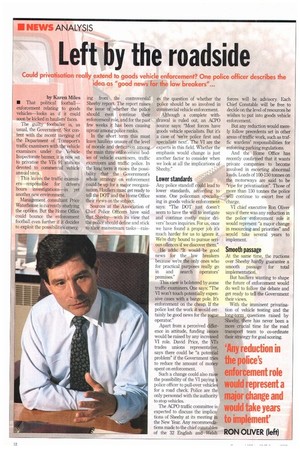Left by the roadside
Page 14

If you've noticed an error in this article please click here to report it so we can fix it.
Could privatisation really extend to goods vehicle enforcement? One police officer describes the idea as "good news for the law breakers"...
by Karen Miles • That political football— enforcement relating to goods vehicles—looks as if it could soon be kicked in hauliers' faces.
The guilty footballer is, as usual, the Government. Not content with the recent merging of the Department of Transport's traffic examiners with the vehicle examiners under the Vehicle Inspectorate banner, it is now set to privatise the VI's 91 stations devoted to commercial vehicle annual tests.
This leaves the traffic examiners—responsible for drivers hours investigations—in yet another new environment.
Management consultant Price Waterhouse is currently studying the options. But the Home Office could bounce the enforcement football even further if it decides to exploit the possibilities emerg
ing from the controversial Sheehy report. The report raises the issue of whether the police should even continue their enforcement role, and for the past few weeks it has been causing uproar among police ranks.
In the short term this must leave hauliers unsure of the level of morale and dedication among the main three enforcement bodies of vehicle examiners, traffic examiners and traffic police. In the long term it raises the possibility that the Government's whole strategy on enforcement could be up for a major reorganisation. Hauliers must get ready to tell the DOT and the Home Office their views on the subject.
Sources at the Association of Chief Police Officers have said that Sheehy—with its view that the police should define and stick to their mainstream tasks—rais
es the question of whether the police should be so involved in commercial vehicle enforcement.
Although a complete withdrawal is ruled out, an ACPO source says: "Most forces have goods vehicle specialists. But it's a case of 'we're police first and specialists next'. The VI are the experts in this field. Whether the emphasis would change is just another factor to consider when we look at all the implications of Sheehy."
Lower standards
Any police standoff c6uld lead to lower standards, according to some. One policeman specialising in goods vehicle enforcement says: "The DOT just doesn't seem to have the will to instigate and continue costly major drivers' hours inquiries. For us, once we have found a proper job it's much harder for us to ignore it. We're duty bound to pursue serious offences if we discover them."
He adds: "It would be good news for the law breakers because we're the only ones who for practical purposes really go in and search operators' premises."
This view is bolstered by some traffic examiners. One says: "The VI won't touch potentially expensive cases with a barge pole. It's enforcement on the cheap. If the police lost the work it would certainly be good news for the rogue operator," Apart from a perceived difference in attitude, funding issues would be raised by any increased VI role. David Price, the VI's trades unions representative, says there could be "a potential problem" if the Government tries to reduce the amount of money spent on enforcement.
Such a change could also raise the possibility of the VI paying a police officer to pull-over vehicles for a road check Police are the only personnel with the authority to stop vehicles.
The ACPO traffic committee is expected to discuss the implications of Sheehy at its meeting in the New Year. Any recommendations made to the chief constables of the 32 English and Welsh forces will be advisory Each Chief Constable will be free to decide on the level of resources he wishes to put into goods vehicle enforcement.
But any reduction would merely follow precedents set in other areas of traffic work, such as traffic wardens' responsibilities for enforcing parking regulations.
And the Home Office has recently confirmed that it wants private companies to become involved in escorting abnormal loads. Loads of 100-150 tonnes on the motorways are said to be "ripe for privatisation". Those of more than 150 tonnes the police will continue to escort free of charge.
VI chief executive Ron Oliver says if there was any reduction in the police enforcement role it would represent "a major change in resourcing and priorities" and would take several years to implement.
Smooth passage
At the same time, the ructions over Sheehy hardly guarantee a smooth passage for total implementation.
But hauliers wanting to shape the future of enforcement would do well to follow the debate and get ready to tell the Government their views.
With the imminent privatisation of vehicle testing and the long-tam questions raised by Sheehy, there has never been a more crucial time for the road transport team to co-ordinate their strategy for goal scoring.
















































































